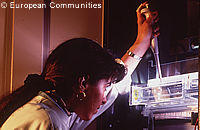Commission report outlines further action for promoting women in science
The participation of women in EU research programmes has increased, but 'gender equality in science [...] will only come into being as a result of shared commitments and actions by all parties involved in scientific research,' states new report by the European Commission's Research DG. The report details progress made in addressing gender issues in European research since the adoption of the Communication 'Women and science: mobilising women to enrich European research' in February 1999. An action plan was implemented as part of the Fifth Framework programme (FP5), and has led to positive results, although these should not obscure the difficulties related to the gender issue in research, states the report. It also notes that the situation of women in science is similar to that of women in general. The new report, 'Women and science: the gender dimension as a leverage for reforming science', announces that the number of women on committees and panels has increased under FP5. For example, the proportion of women on programme monitoring panels has risen from six per cent during FP4 to 22 per cent in 1999 and 30 per cent in 2000. In future, human resources gender indicators are to be attained in three ways: the introduction of the gender variable in the collection of data on human resources in R&D, organising existing data collected at national level and by gendering the benchmarking exercise. The Commission will also seek to build upon preliminary networking arrangements in order to establish a 'European Network of Networks', which will help existing networks increase the efficiency of their actions, both in supporting women scientists and in shaping the policy process. Before the end of 2001, the Commission will also set up an expert group with the task of analysing the situation of women in research in the private sector. It is also intended to establish a link with regional policy and, in 2002, to establish an expert group to monitor the situation of women in science in Central and Eastern Europe. The Gender Watch System in the Sixth Framework programme will build on current experience, integrating recommendations from the ETAN report and gender impact studies, as well as taking stock of the new gender awareness reached among the different stakeholders in research, states the Commission report. Research will also be undertaken in order to improve the understanding of the gender issue in science by developing knowledge and policy tools. According to the report, this will include the development and production of indicators, analysis of mechanisms of segregation, methodologies of mainstreaming, case studies in scientific institutions, assessment of policies and methodologies for benchmarking, evaluation of the gender watch system in FP6 and research into the history, sociology and philosophy of science from the feminist perspective. The report discusses the ETAN report, which highlights the fact that less than ten per cent of the top positions in the scientific system are held by women, despite half of graduates being women. The ETAN report criticises the operation of the peer review system, and states that the involvement of women in shaping scientific policy and setting the agenda in the top committees of the EU and of the Member States is much too low. The report advocates a reform of science and scientific institutions in order to attain a lasting and sustainable improvement of women's situations in research. The Commission report also discusses the work of the Helsinki group, a group of national civil servants involved in promoting women in scientific research at national level. The group is assisting the Commission in the preparation of comparable European statistics and indicators for monitoring the involvement of women in European research and the promotion of discussions of policies encouraging the participation of women in scientific research, which have been implemented at various levels across Europe. The Helsinki group will be maintained in the future, states the report.



